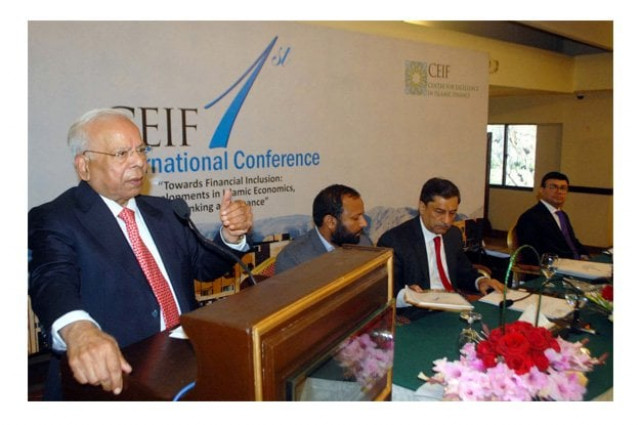A need to reshape: ‘Islamic, conventional banks not too far apart’
They have only 1% of banking assets in the country

PHOTO: PPI
They were speaking at a two-day international conference on Islamic banking, organised by the Institute of Management Sciences.
Questioning the economic value of current Islamic banks
The objective of the gathering was to discuss the present state of Islamic business and finance and how the system could contribute to the national economy.

“Unfortunately, we have not even reached the level of expectation for which the country had started Islamic banking,” said former State Bank of Pakistan governor Dr Ishrat Husain, currently Dean and Director of the Institute of Business Administration. “They have continued to work on the same path as conventional banks do.” In Pakistan, Husain said, Islamic banking was introduced 10 years ago, but it could not prove effective and hardly constituted 1% of banking assets of the country.
He cited some of the reasons for the lack of progress which included the failure to reach out to small farmers and small industries and lack of focus on investment in real estate and financing education. Above all, he remarked, no Islamic banking professionals were available in the country.
Prospects of Islamic banking in Pakistan
“I am not satisfied with the way they are doing the job. Right from the top management to the branch manager, all has been drawn from conventional banks; they have no training or expertise in Islamic banking,” he said.
“It is said that the whole foundation of Islamic banking is based on justice, but justice has never been defined,” remarked Mehboobul Hasan of King Saud University, Saudi Arabia.
He said money hoarding was a crime, which caused inequality in wealth distribution, but there was no justice under the Islamic banking system to tackle this and other malpractices. “This is the reason why common people have little confidence in this system.”
Hasan added Islamic banking meant equal distribution of finance to everyone and until that happened there would be no Islamic banking system.
Published in The Express Tribune, January 28th, 2016.
Like Business on Facebook, follow @TribuneBiz on Twitter to stay informed and join in the conversation.



















COMMENTS
Comments are moderated and generally will be posted if they are on-topic and not abusive.
For more information, please see our Comments FAQ